Related Research Articles

John Wood Campbell Jr. was an American science fiction writer and editor. He was editor of Astounding Science Fiction from late 1937 until his death and was part of the Golden Age of Science Fiction. Campbell wrote super-science space opera under his own name and stories under his primary pseudonym, Don A. Stuart. Campbell also used the pen names Karl Van Kampen and Arthur McCann. His novella Who Goes There? was adapted as the films The Thing from Another World (1951), The Thing (1982), and The Thing (2011).

Robert Anson Heinlein was an American science fiction author, aeronautical engineer, and naval officer. Sometimes called the "dean of science fiction writers", he was among the first to emphasize scientific accuracy in his fiction, and was thus a pioneer of the subgenre of hard science fiction. His published works, both fiction and non-fiction, express admiration for competence and emphasize the value of critical thinking. His plots often posed provocative situations which challenged conventional social mores. His work continues to have an influence on the science-fiction genre, and on modern culture more generally.
" '—All You Zombies—' " is a science fiction short story by American writer Robert A. Heinlein. It was written in one day, July 11, 1958, and first published in the March 1959 issue of The Magazine of Fantasy & Science Fiction after being rejected by Playboy.
"Delilah and the Space Rigger" is a science fiction short story by American writer Robert A. Heinlein. One of his Future History stories, it originally appeared in Blue Book in December 1949 and was reprinted in his collection, The Green Hills of Earth.
"The Green Hills of Earth" is a science fiction short story by American writer Robert A. Heinlein. One of his Future History stories, the short story originally appeared in The Saturday Evening Post, and it was collected in The Green Hills of Earth. Heinlein selected the story for inclusion in the 1949 anthology My Best Science Fiction Story. "The Green Hills of Earth" is also the title of a song mentioned in several of Heinlein's novels.
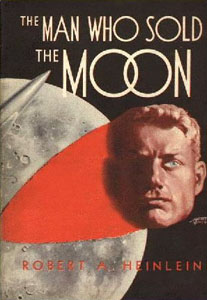
"The Man Who Sold the Moon" is a science fiction novella by American author Robert A. Heinlein, written in 1949 and published in 1950. A part of his Future History and prequel to "Requiem", it covers events around a fictional first Moon landing in 1978 and the schemes of Delos D. Harriman, a businessman who is determined to personally reach and control the Moon.

The Man Who Sold the Moon is the title of a 1950 collection of science fiction short stories by American writer Robert A. Heinlein.

The Green Hills of Earth is a collection of science fiction short stories by American writer Robert A. Heinlein, published in 1951, including short stories published as early as 1941. The stories are part of Heinlein's Future History. The title story is the tale of an old space mariner reflecting upon his planet of birth. According to an acknowledgement at the beginning of the book, the phrase "the green hills of Earth" is derived from a story by C. L. Moore.
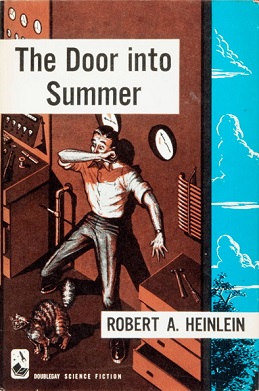
The Door into Summer is a science fiction novel by American science fiction writer Robert A. Heinlein, originally serialized in The Magazine of Fantasy & Science Fiction. It was published in hardcover in 1957.
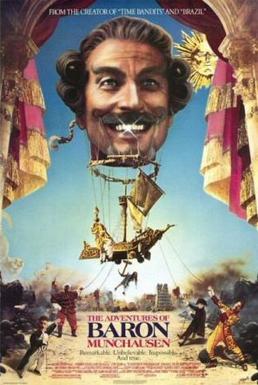
The Adventures of Baron Munchausen is a 1988 adventure fantasy film co-written and directed by Terry Gilliam, and starring John Neville, Sarah Polley, Eric Idle, Jonathan Pryce, Oliver Reed, Robin Williams and Uma Thurman. An international co-production between the United Kingdom, the United States and Germany, the film is based on the tall tales about the 18th-century German nobleman Baron Munchausen and his wartime exploits against the Ottoman Empire.

Baron Munchausen is a fictional German nobleman created by the German writer Rudolf Erich Raspe in his 1785 book Baron Munchausen's Narrative of his Marvellous Travels and Campaigns in Russia. The character is loosely based on a real baron, Hieronymus Karl Friedrich, Freiherr von Münchhausen.
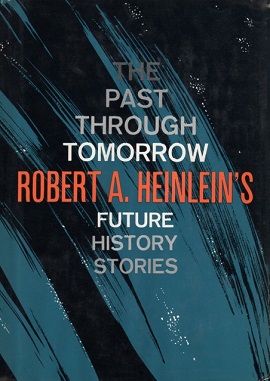
The Past Through Tomorrow is a collection of science fiction stories by American writer Robert A. Heinlein, first published in 1967, all part of his Future History.
Bangsian fantasy is a fantasy genre which concerns the use of the afterlife as the main setting within which its characters, who may be famous preexisting historical or fictional figures, act and interact. It is named for John Kendrick Bangs (1862–1922), who often wrote it.
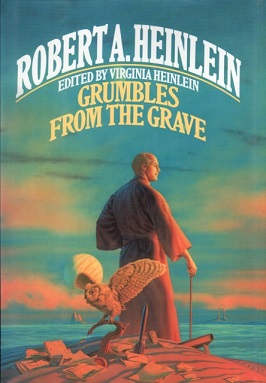
Grumbles from the Grave is a posthumous 1989 autobiography of science fiction author Robert A. Heinlein collated by his wife Virginia Heinlein from his notes and writings.
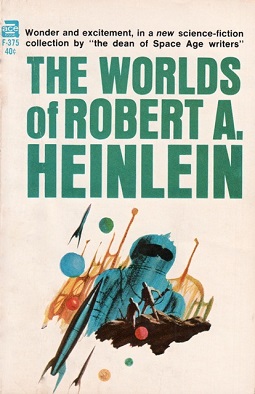
The Worlds of Robert A. Heinlein is a collection of science fiction short stories by American writer Robert A. Heinlein, published in 1966.
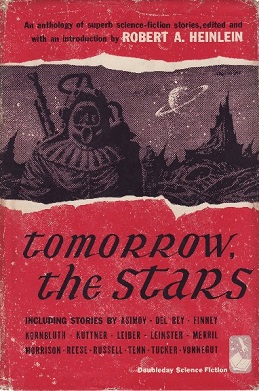
Tomorrow, the Stars is an anthology of speculative fiction short stories, presented as edited by American author Robert A. Heinlein and published in 1952.
The science fiction writer Robert A. Heinlein (1907–1988) was productive during a writing career that spanned the last 49 years of his life; the Robert A. Heinlein bibliography includes 32 novels, 59 short stories and 16 collections published during his life. Four films, two TV series, several episodes of a radio series, at least two songs and a board game derive more or less directly from his work. He wrote a screenplay for one of the films. Heinlein edited an anthology of other writers' science fiction short stories.
The Heinlein juveniles are the science fiction novels written by Robert A. Heinlein for Scribner's young-adult line. Each features "a young male protagonist entering the adult world of conflict, decisions, and responsibilities." Together they tell a loosely-connected story of space exploration. Scribner's published the first twelve between 1947 and 1958, but rejected the thirteenth, Starship Troopers. That one was instead published by Putnam. A fourteenth novel, Podkayne of Mars, is sometimes listed as a "Heinlein juvenile", although Heinlein himself did not consider it to be one.
"The Moon Is a Harsh Mistress" is a song by American songwriter Jimmy Webb. It has become a much-recorded standard, without ever having charted as a single. Webb appropriated the title from the 1966 science fiction novel The Moon Is a Harsh Mistress by Robert A. Heinlein. The song is especially associated with Glen Campbell, who performed the song on his farewell tour, Judy Collins, Linda Ronstadt, and Joe Cocker, who first recorded the song in 1974.
My Object All Sublime is a science fiction short story written by Robert A. Heinlein, originally printed under the pen name Lyle Monroe, in the February 1942 issue of Future magazine. Its plot follows an invisible man through his adventures.